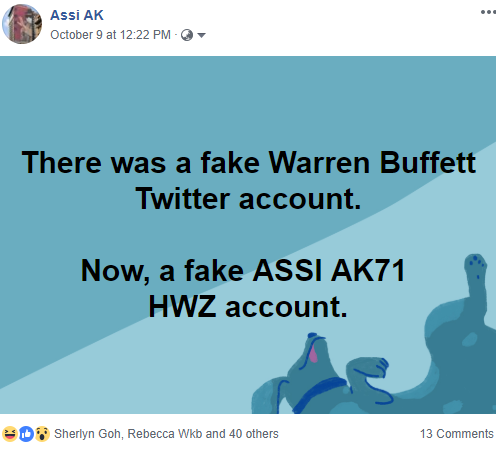UPDATED (DEC 2016):
People do lose their jobs and for those who are financially leveraged to the max, it could be hell.
A reader's comment:
"...recently I attended a workshop at LLI. I spoke to an uncle in his 50s who is unemployed after he was retrenched... He has friends in the same industry who bought multiple properties and are currently retrenched as well... Other friends working in a prominent engineering company received letters asking them to opt for voluntary retirement after 59..."
Full comment: here.
If those multiple properties are rented out and if the rentals are able to cover the mortgages, good.
With the rental market being what it is (i.e. high vacancy rate and declining rents) or if the properties were purchased in the last 3 or 4 years (i.e. relatively high purchase prices and low rental yield), his friends (without an adequate emergency fund) could be in trouble.
Don't let greed get to us.
Always stay grounded.
Over leveraging (explained at the end of this blog post) could lead to trouble.
Financial prudence will not make us rich overnight but it will ensure we avoid painful falls some of which we might not recover from.
(Up to November this year, more than 800 transactions involving non-landed private properties were loss-making, double the figure in 2015. Analysts told The New Paper that "unprofitable" deals are common in a cyclical downturn where market sentiment and employment prospects are poor. Expectations of a US Fed rate hike by the end of the year, which would increase interest rates here, are also driving these loss-making sales. Source: The New Paper, 13 Dec 16)
------------------------
We always hope to make money from our investments and this could happen through capital gains, regular income or both.
Knowing our motivations for being invested will go a long way in determining what are suitable investments for us.
It is well known that the luxury segment of the residential property market in Singapore has never been very good for income investors.
In recent times, it has become worse.
A gross rental yield of 2% is considered to be quite good for some properties in this segment, it seems, if tenants could be found at all as vacancy rate has been climbing.
Well, investors who bought into luxury residential properties in Singapore were probably going for potential capital gains and not rental income, anyway.
This means that they hope to sell their properties at a higher price to another buyer later on.
The early birds did quite well but, increasingly, more buyers are resorting to leasing out their properties due to a lack of buying interest.
This has depressed rentals further in this segment.
When monthly rental income declines to a point where it is unable to cover the mortgage payments, we could see fire sales and there is plenty of anecdotal evidence that this is already happening.
"According to Colliers International’s research, the average monthly gross rents of luxury/super-luxury apartments slid by yet another 1.4% QoQ to $5.20 per sq ft per month as of 2Q 2014, following the 1.9% QoQ fall in 1Q 2014." Source: Colliers International
I have been receiving emails offering discounts on properties in Singapore and some of them are of the high end kind.
A small one bedroom (shoebox) apartment near Orchard Road for $1.1 million, down from $1.3 million, anyone?
I think that it is a sign of the times and we won't be wrong to expect more discounting both by developers and more marginal buyers of luxury residential properties here.
Buying a residential property in the hope that we could find buyers who would pay a much higher price for it in a short time is no longer a game we can play in Singapore unless the entry price were to be so attractive that even after accounting for the seller stamp duty (payable if the property is sold within 4 years of purchase), we could still make a decent gain.
However, if a developer had to resort to a 20% discount in order to move unsold stock, what makes us think that we would be able to sell at the pre-discounted price to anyone else? What? Not now? Maybe, 4 years later?
Well, with many more projects to be completed in the next few years, if anything, the secondary market will become even more challenging for sellers.
Indeed, prices are more likely to trend downwards in the next few years than not.
When we take a speculative position, it is important that we understand that it is a speculative position.
It means that we should be able to exit rapidly, cutting our losses, if required.
With conditions the way they are in Singapore now for the residential property market, this would be extremely difficult and also costly to do.
For people without deep pockets, it could even be disastrous.
What do I mean by deep pockets?
Sometimes, we look at some companies' numbers and we might wonder why they have debts although they have more than enough cash to repay their debts.
It is because we should always have ample liquidity close at hand to take advantage of opportunities.
Having ample liquidity also means that if things go wrong like they sometimes do, these companies could pay down their debts rapidly.
Take a look at this company's numbers, for example,
So, for the more adventurous ones in our midst, please think again and again before handing over that cheque when temptations find their way into our mailbox.
"Is it a good deal?" is only the first question we must ask.
"Do we have deep pockets?" is an important second question.
"...overleveraging is a situation when people are borrowing money, hoping to make money but do not have enough capital assets to cover any likely future losses." (See related post #5)
Related posts:
1. CCR, RCR or OCR for rental income?
2. How to be rich when the world collapses?
3. Smaller apartments' prices more resilient.
4. Don't think and grow rich!
5. Leverage up and buy investment properties now?
































